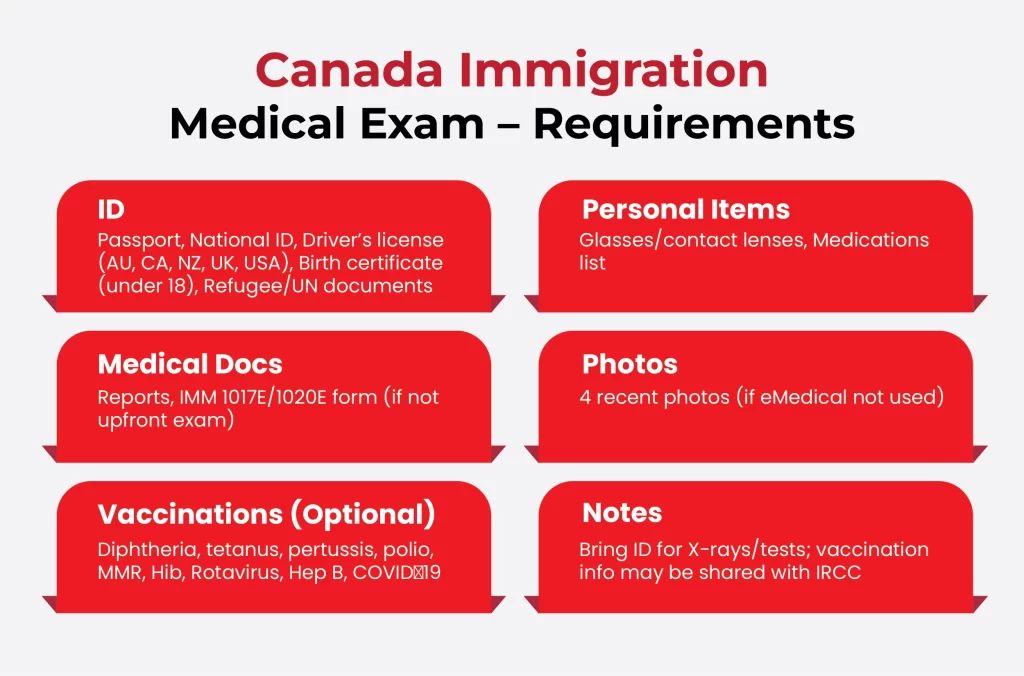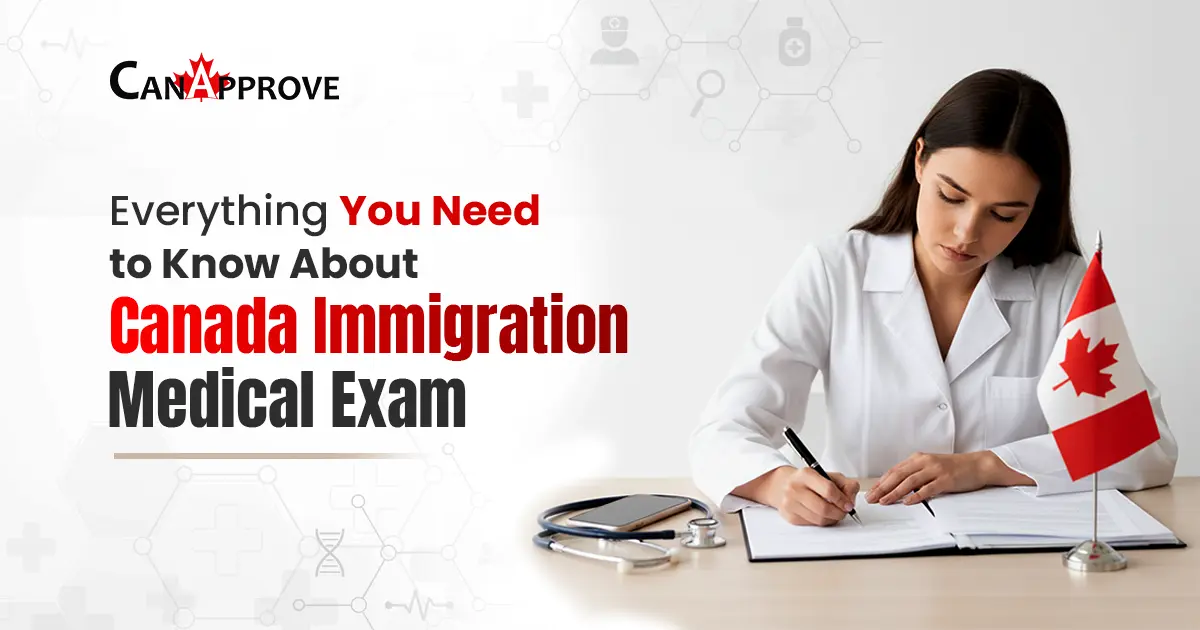Before your immigration papers can take flight, there’s an essential step you can’t overlook, the Canada Immigration Medical Exam. It’s more than a routine check-up; it’s your ticket to a hassle-free immigration process, ensuring you meet Canada’s health requirements. In this blog, we’ll guide you through everything you need to know, from the tests involved to tips for a smooth experience, so you can focus on planning your Canadian adventure worry-free.
Table Of Content
1What is Canada Immigration Medical Exam?2Who needs a Medical Exam for Canada?3Canada Medical Test List4Canada Immigration Medical Exam Requirements5How much does Canada Immigration Medical Exam Cost?6Canada Immigration Medical Exam Validity7Latest Canada Medical Exam Changes for Express Entry PR Applicants8Frequently Asked Questions
What is Canada Immigration Medical Exam?
The Canada Immigration Medical Exam is a mandatory health assessment for most individuals applying to immigrate, work, or study in Canada for six months or longer. This examination is designed to ensure that applicants do not pose a risk to public health or safety and do not have medical conditions that might place excessive demand on Canada’s healthcare system.
The exam must be conducted by a panel physician approved by Immigration, Refugees and Citizenship Canada (IRCC); regular family doctors are not eligible for this process. It includes a review of medical history, a physical and mental health evaluation, and laboratory tests (such as blood work, chest X-rays, and urine tests), with additional checks for infectious diseases and up-to-date immunizations as required.
Who needs a Medical Exam for Canada?
Most Canada immigration applicants require a medical exam if they are applying for Canada PR, or if they intend to stay in Canada for more than six months in specific roles, countries, or visa categories.
Medical exams are mandatory for:
- All permanent residence applicants and their accompanying dependents, regardless of whether they will travel to Canada or not.
- Temporary residents (including visitors, students, and workers) who plan to work in jobs that protect public health, such as healthcare workers, nursery/daycare staff, clinical lab workers, and teachers.
- People who have lived for six months or more in certain countries or territories with elevated health risks prior to coming to Canada.
- Applicants for the parent and grandparent super visa, regardless of duration of stay.
Applicants visiting Canada for less than six months generally do not require a medical exam unless working in public health-sensitive occupations. The visa office will provide specific instructions as part of the application process.
Canada Medical Test List
The Canada Immigration Medical Exam includes several required tests and health checks to determine an applicant’s fitness for entry. These tests are designed to detect contagious diseases, assess overall health, and ensure applicants do not have conditions that could pose a public health risk or burden the Canadian health system.
The Common Medical Tests include:
- Physical examination (eyes, ears, nose, heart, lungs, abdomen, skin)
- Medical history review and questionnaire
- Chest X-ray (for applicants aged 11 and over)
- Blood tests (HIV, syphilis, and sometimes hepatitis or serum creatinine)
- Urine test (includes assessment for renal and urinary tract health, and for some drugs)
- Immunization record check (especially for children; measles, mumps, rubella, and others)
- Mental health assessment if needed
Panel physicians may add additional tests based on the applicant’s history or IRCC guidelines. Test requirements may vary for children; for example, blood tests usually apply to applicants aged 15 and above, while urinalysis is needed from age 5.
Canada Immigration Medical Exam Requirements
Before your Canada Immigration Medical Exam, make sure to bring all the necessary documents and items to ensure a smooth and hassle-free process.
This includes proper identification, medical reports, a list of medications, any vaccination records, and photographs if required. Being fully prepared will help the panel physician complete your examination efficiently and avoid delays in your immigration application.

1. Valid Identification (passport recommended)
Other accepted IDs:
- National ID card
- Driver’s license from Australia, Canada, New Zealand, UK, or USA
- Original birth certificate (if under 18)
- Refugee travel document, Red Cross travel document, UN laissez-passer, seaman’s book, Organization of American States travel document, or refugee protection identity document
2. Personal Items
- Eyeglasses or contact lenses (if used)
- List of current medications
3. Medical Documents
- Any medical reports or test results for existing or previous conditions
- Medical Report form (IMM 1017E or IMM 1020E) if not doing an upfront exam
4. Photos
- 4 recent photographs (if panel physician doesn’t use eMedical)
5. Vaccination Proof (optional, encouraged)
- Diphtheria, tetanus, pertussis, polio
- Haemophilus influenzae type b
- Measles, mumps, rubella
- Rotavirus, hepatitis B, COVID-19
Other Notes
- If referred for X-ray or tests, bring identification again
- Vaccination history may be recorded and shared with IRCC if consented
How much does Canada Immigration Medical Exam Cost?
The cost of the Canada Immigration Medical Exam typically ranges from CAD 140 to CAD 280 per person depending on the clinic and required tests.
In India, the fees range approximately from INR 3,600 for young children to INR 9,550 for adults, covering physical exams, blood tests, chest X-rays, and urine tests.
Payment is usually required in full at the appointment time and may vary by location and panel physician.
Canada Immigration Medical Exam Validity
The Canada Immigration Medical Exam is valid for 12 months from the date of the exam.
If the medical exam expires before Immigration, Refugees and Citizenship Canada (IRCC) processes the application or the applicant lands in Canada, a new medical exam must be completed.
As part of the Canada PR requirements, applicants will be notified to redo the exam before their current medical report expires to avoid delays in processing.
Latest Canada Medical Exam Changes for Express Entry PR Applicants
As of August 21, 2025, Immigration, Refugees and Citizenship Canada (IRCC) introduced important changes to the Canada Immigration Medical Exam requirement for those applying for permanent residence through Express Entry.
Here are the main points:
| Change | Details |
|---|---|
| Upfront IME (Immigration Medical Exam) Required | All Express Entry applicants must complete the medical exam before submitting their PR application. This is called an upfront medical exam. |
| Who it applies to | Principal applicant and all family members, including dependents, even if they are not accompanying. |
| Exceptions / Exemptions | You may be exempt if you already live in Canada and you did an IME within the past 5 years that showed low risk or no risk to public health/safety. If you qualify, you must include the IME number or unique medical identifier from your previous exam. |
| Validity of the IME | Medical exam results are valid for 12 months. If your exam is older, or IRCC determines the old IME can’t be used, you’ll need a new one. |
| What changed from before | Before this, applicants could submit their PR application first, then wait for IRCC to request a medical exam later in the process. Now medicals must be done before application submission (unless exempt). |
| Extended policy for certain in-Canada applicants | If you’re in Canada and completed a previous IME in past 5 years, under the updated rules you may use this until at least October 5, 2029, depending on whether it meets risk standards. |
You can read more on the official IRCC site here Medical examination for permanent residence applicants (IRCC).





